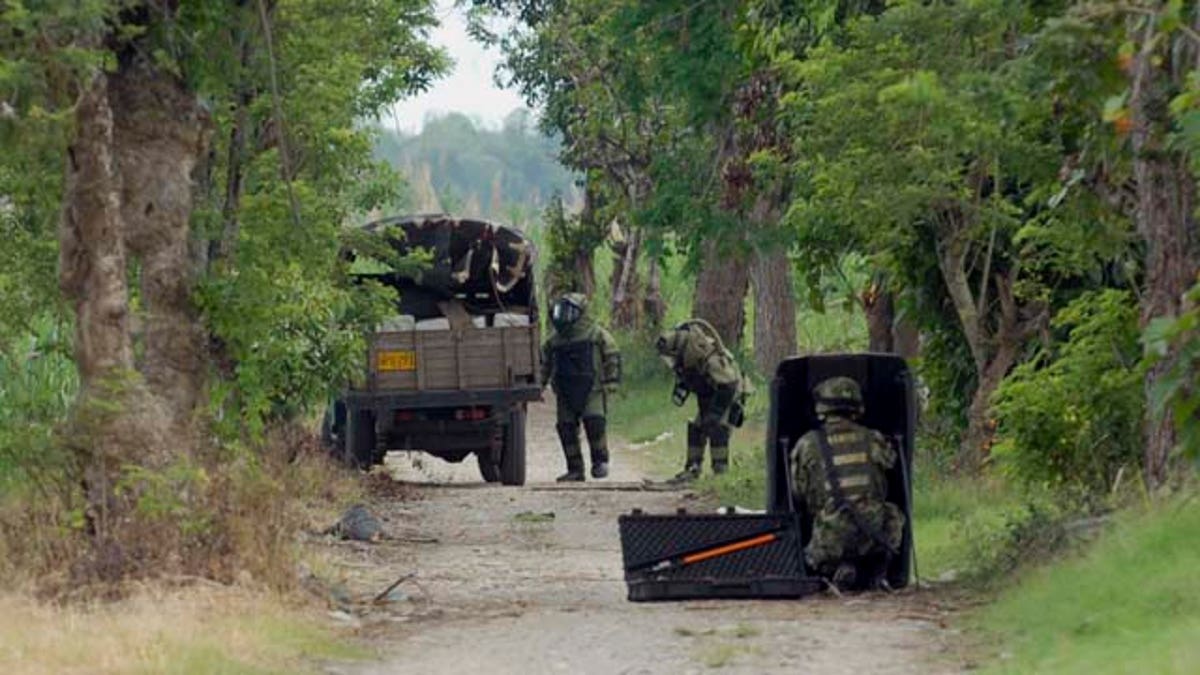
Members of a police bomb squad inspect a truck believed to be loaded with explosives in Corinto, southern Colombia, Tuesday June 21, 2011. The officers did not find explosives in the vehicle, instead they found one ton of marijuana. Rebels of the Revolutionary Armed Forces of Colombia, FARC, and the National Liberation Army, ELN, are active in the region. (AP Photo/Carlos Julio Martinez) (AP2011)
BOGOTÁ – While Colombia has enjoyed a renaissance period of stronger security and better success in its war against left-wing rebels known as the FARC, a recent wave of crime and violence has hit the nation.
Criminal gangs, also known as "bandas criminales," or "BACRIMS," carry arms, are well-organized and are involved in robberies, kidnappings and murder. But what's troubling this nation about the groups is who their members are.
"The word 'criminal gang' is an incorrect term," says Camilo González, head of the Colombian NGO Indepaz and the former health minister. "The government calls them that because they fit the description of an organized crime group. But they're actually narco-paramilitaries who were never demobilized and hit the streets right from the battlefield."
This is quite troubling to an everyday Colombian in "safe" parts of the country because they are now seeing former fighters of an ongoing civil war seep into the city streets and wreak their havoc.
Right-wing paramilitary groups were historically a band of people who served as armed defenders of cattle ranchers' land from FARC (the Revolutionary Armed Forces of Colombia) guerillas. Originally supported by the military, the Colombian government had to eventually cut off all support to paramilitaries when the group got involved in narco-trafficking and kidnapping to fund themselves.
Now, a land war still wages on against the left-wing rebels. And many believe the Colombian military continues to support paramilitaries to make sure the guerillas don't win.
It's a charge that the government strongly denies.
The head of the Colombian National Police, General Oscar Naranjo, has declared that the biggest threat to national security is now the activities of BACRIMS. Several NGOs, including the Washington-based Human Rights Watch, have warned against the groups' abuses.
In its 2011 annual report, the organization highlighted the gangs' increased territorial control as something to pay attention to. While the government here has had recent success against the drug trade, there's concern that narco-traffickers are worrying less about the routes through jungle and are taking their business to the new emerging market in urban centers.
"They now choose places like Bogotá because it's the business center of their operations," says Camilo González. "They can use businessmen and lawyers to get what they want. And it's all legal."
González talks of how corruption in this nation lends to these groups because they can buy their way into the market by paying off important people. Then, they can buy into legitimate businesses like hotels and malls and launder their money.
This allows BACRIMS to become more powerful. It's becoming a bigger concern each day as police statistics show that almost half of the homicides last year (7,200 out of 15,400) were related to fighting between BACRIMS and street gangs.
In the end, many still point the finger at the government because they even have a hard time of keeping track of where many demobilized paramilitiaries go after they leave the battlefield and try to live "legitimate" lives.
"Of the 32,000 demobilized fighters, the government only knows the whereabouts of 5,000 of them," explains González. "They go home. Then, they disappear."
With all of these ex-fighters unaccounted for, it's all but certain that they have formed these gangs and are getting back into their old line of work. The capital of Bogotá prides itself on being a place that has become more secure over the past eight years.
At first, local leaders denied the existence of BACRIMS in the city. Now, with such a big increase in crime and violence, they have admitted that the groups are active here. An Indepaz report has even more grim news, showing that there is currently neo-paramilitary presence in one-third of the country.
David Noto is the Latin American correspondent for Fox News Radio in Bogotá, Colombia.
Follow us on twitter.com/foxnewslatino
Like us at facebook.com/foxnewslatino








































